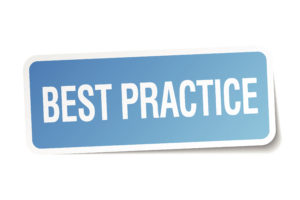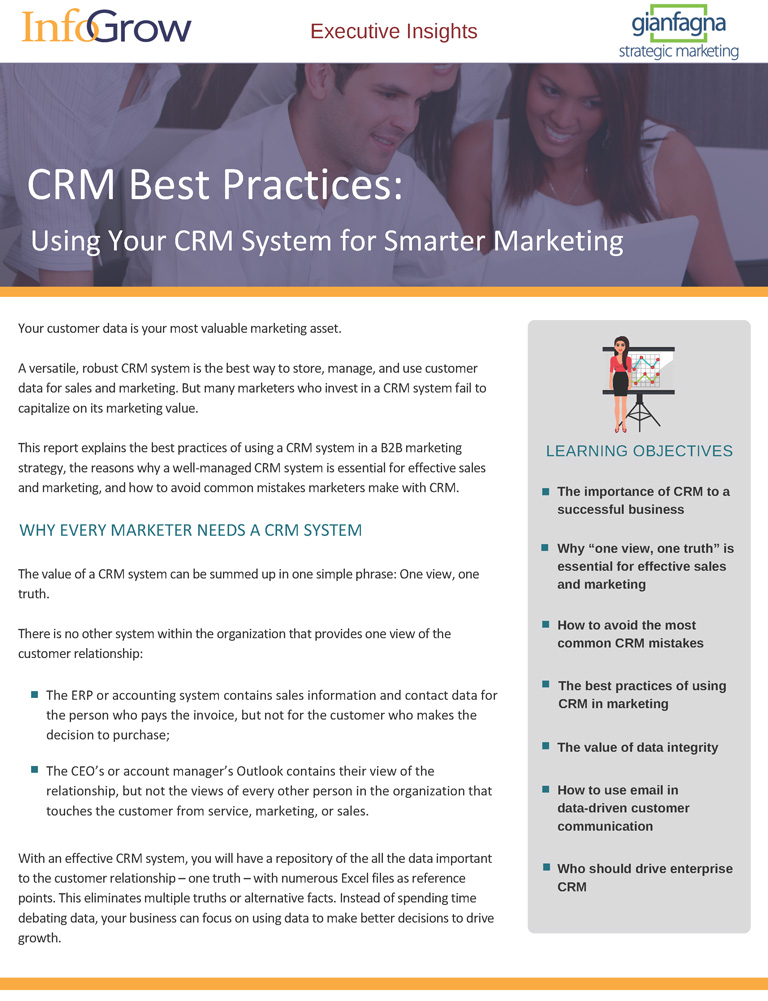Marketing Best Practices: Using a CRM System for Marketing
 A customer relationship management (CRM) system enables you to store, manage, and use your customer and prospect data for sales and marketing. But too many marketers fail to capitalize on the power of a CRM system when planning and executing marketing strategies.
A customer relationship management (CRM) system enables you to store, manage, and use your customer and prospect data for sales and marketing. But too many marketers fail to capitalize on the power of a CRM system when planning and executing marketing strategies.
Here are five best practices for using the capabilities of your CRM system in a smart B2B marketing strategy from my experience as a B2B marketing consultant.
You’ll find more best practices and other insights in our new white paper, CRM Best Practices: Using Your CRM System for Smarter Marketing, co-published with InfoGrow Corporation. Click here to request your free copy.
5 Proven Best Practices for Using a CRM System for Smarter Marketing
- Data Cleanup & Standardization
A CRM system gives you the structure and parameters for creating proper data records and establishes protocols for adding data to customer and prospect files. This standardization creates cleaner files and richer data you can access for more relevant and accurate messaging.
- Data Appending
Besides contact fields and transaction information, you can create and populate fields you’ll need for marketing to customers and prospects, like NAICS codes, employee size, annual revenue, headquarters v. regional office, etc. This data also can be appended to your files via commercial data sources to create more robust profiles.
It’s also smart to append ERP summary information to your customer files so you’ll have quarter-to-date and year-to-date data that can easily be compared to the previous year.
- Segmentation for Targeted Marketing
Data on your CRM system can help you classify customers and prospects into groups by many different criteria, such as title, industry, size, or location.
Once you’ve grouped customers and prospects into defined segments with shared characteristics, you can develop communications and marketing plans and campaigns tailored to each segment.
You also can create customized communication and marketing queues to consistently deliver relevant, high-value content targeted to the interests of each segment. This enables you to build stronger customer relationships and more effectively nurture leads.
- Determining Customer Value
Every marketer should be using their CRM data to gain a better understanding of the value of each customer.
Start with determining basic Customer Lifetime Value (CLV). Use this to rank customers by their importance to your business and sort customers into groups by value, such as best customers, mid-level customers, and least-best customers.
Knowing customer value enables you to lavish sales and service attention on those top-tier customers who warrant it based on their behavior.
You also can determine which customers are underperforming. This can help you identify mid-level customers that should be buying more based on their industry, size, or similarity to the best customer profile. And you can avoid wasting sales and marketing resources on least-best customers who buy rarely or in low volume.
- Prospecting
Once you know what your best customers look like, you can use that data to find prospects with similar profiles on your prospect database or on commercial databases. These prospects will be most likely to understand your value proposition and be interested in your products and services.
Want More Best Practices? Get Our Free White Paper
Our comprehensive, new white paper  can help you understand the best practices of using your CRM system and customer data to create a smart marketing strategy. You’ll learn:
can help you understand the best practices of using your CRM system and customer data to create a smart marketing strategy. You’ll learn:
- The importance of CRM to a successful business;
- How to avoid the most common CRM mistakes;
- Why “one view, one truth” is essential for effective sales and marketing;
- The value of data integrity;
- How to use email in data-driven customer communication;
- Why marketing should drive enterprise CRM.
CRM Best Practices: Using Your CRM System for Smarter Marketing is yours without obligation. Request your free copy today.





No Comments
Sorry, the comment form is closed at this time.